Key takeaways:
- Hygiene practices, such as handwashing and cleanliness, are essential for preventing illness, reducing stress, and promoting mental well-being.
- The impact of personal hygiene extends to public health, with improved sanitation leading to lower disease rates and a better quality of life for communities.
- Emerging trends in hygiene include technology innovations and personalized products, driven by increased awareness and changing habits stemming from the pandemic.
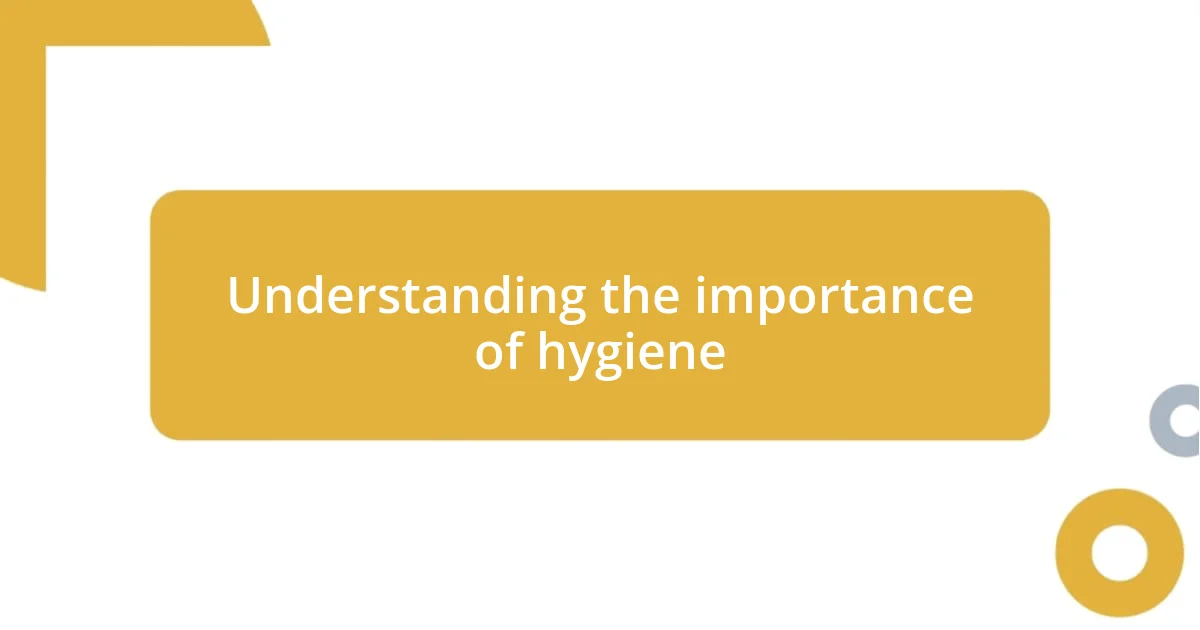
Understanding the importance of hygiene
When I think about the role of hygiene, I can’t help but recall those moments in my childhood—like when my grandmother would insist on washing our hands before every meal. At the time, I thought it was just a quirky habit, but now I realize that those small practices laid the foundation for understanding how cleanliness can impact our health. It’s fascinating to think about how something as simple as soap and water can prevent illness. Isn’t it incredible how these everyday routines can significantly reduce the risk of infection and disease?
Moreover, hygiene goes beyond physical health; it profoundly affects our mental well-being. I remember feeling a sense of calm and control after thoroughly cleaning my living space, especially during those chaotic times in life. Cleanliness can cultivate an environment of peace, which fosters a clearer mindset. Have you ever noticed how a tidy, hygienic space can help you feel more relaxed and focused?
Finally, consider the social aspect of hygiene. There’s often an unspoken pressure to maintain a certain level of cleanliness—not just for ourselves, but for others. When I visit friends’ homes, I’m always a bit more mindful of my personal hygiene, understanding that it’s a way of showing respect. How do we perceive others’ cleanliness, and what does it say about us? Each interaction can either strengthen or strain relationships, and hygiene plays a surprising role in that dynamic.
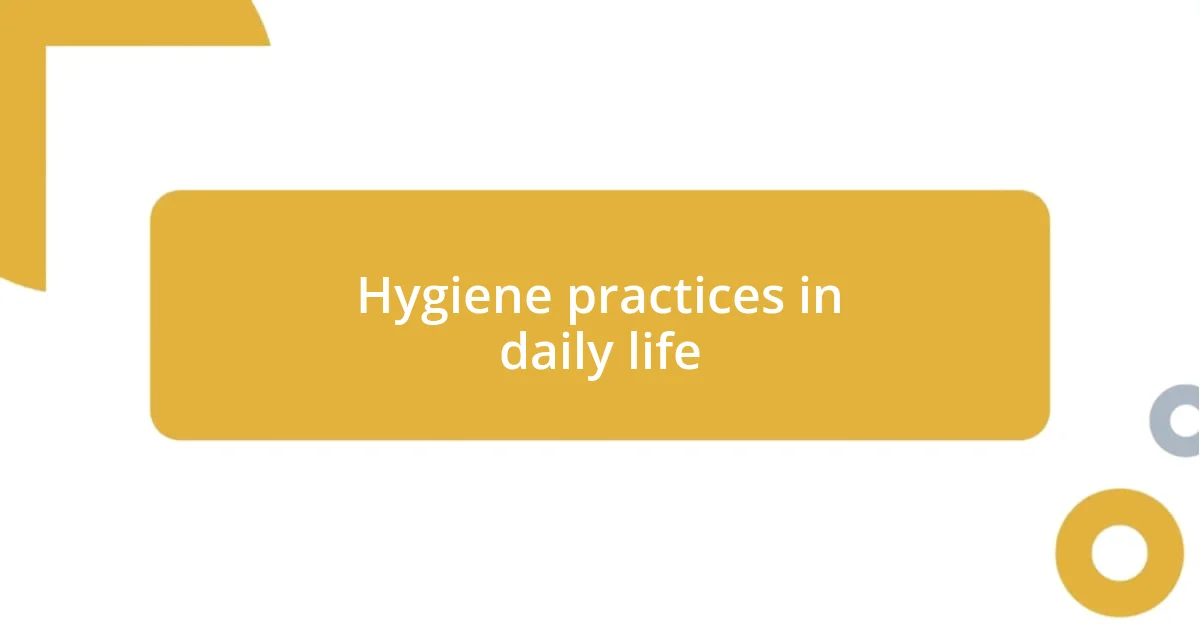
Hygiene practices in daily life
In my daily routine, I find that simple hygiene practices can transform how I feel throughout the day. For instance, I’ve made it a habit to start my mornings with a refreshing shower. It’s not just about getting clean; it’s a moment of clarity before diving into the hustle of the day. I believe that rituals like this set a positive tone for everything that follows.
Here are some essential hygiene practices I incorporate into my daily life:
-
Handwashing: I wash my hands whenever I come home, before meals, and after using the restroom. It’s a small act that I think of as my first line of defense against germs.
-
Oral Care: Brushing my teeth twice a day isn’t just about fresh breath; it’s a reminder to take care of myself.
-
Skincare Routine: I’ve noticed that taking a few minutes each day for my skin not only enhances my appearance but also boosts my confidence.
-
Clean Environment: Tidying up my living space regularly gives me a sense of control and peace. It’s amazing how a clean area can lift my spirits and help me think more clearly.
These small yet consistent practices have created a rhythm in my life, helping me feel grounded and in tune with my surroundings.
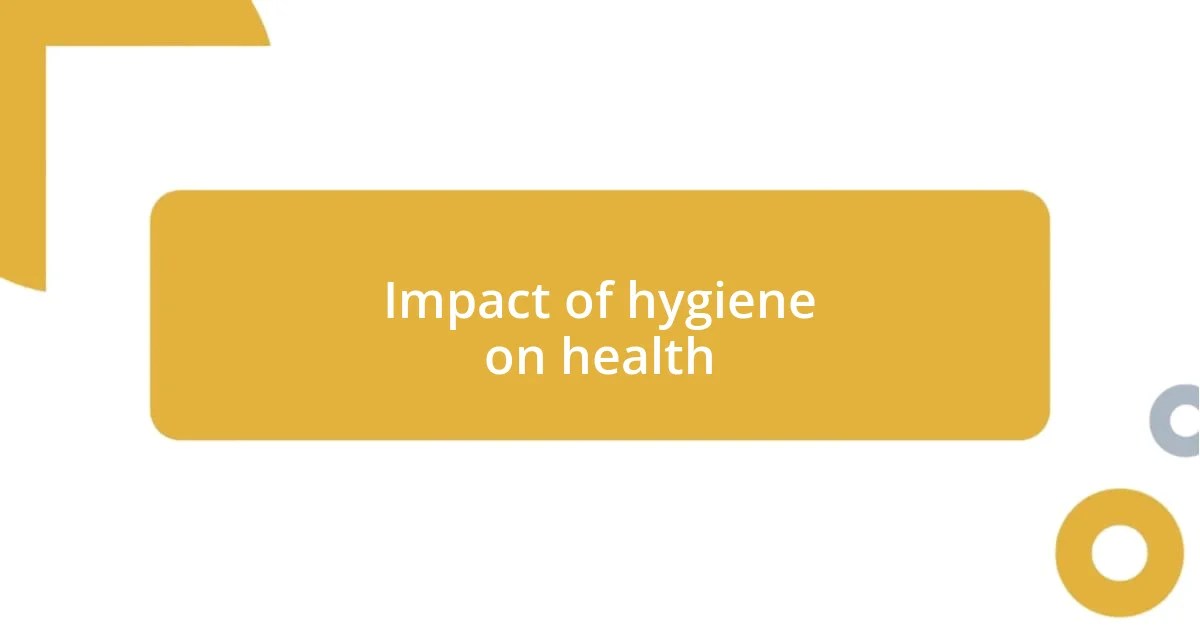
Impact of hygiene on health
When I think about the impact of hygiene on health, I often remember a time when I got a severe cold right after a particularly busy week of neglecting my handwashing. It served as a vivid reminder that viruses and bacteria thrive when we let our guard down. Regular hand hygiene can significantly reduce the risk of respiratory infections. Simply washing hands with soap and water, or using hand sanitizer, creates a barrier against the germs that can lead to illness. I’ve found that integrating this habit into my routine not only keeps me healthier but also allows me to feel empowered against sickness.
On a broader scale, the influence of hygiene on overall public health cannot be overstated. For instance, during my volunteer work at a local health clinic, I witnessed firsthand the difference clean drinking water and sanitation facilities made. Communities that prioritized basic hygiene practices saw lower rates of gastrointestinal diseases and increased life expectancy. It’s both humbling and motivating to see how access to hygiene can transform the health landscape of an entire community.
Let’s not overlook the impact of personal hygiene on mental health as well. There have been days when I honestly felt overwhelmed by life’s chaos, yet taking the time to shower and groom myself helped lift my spirits. It’s like a reset button for my mind. I create a fresh slate where I can refocus and approach the day with renewed energy. This connection between cleanliness and emotional well-being is something I’ve come to cherish, illustrating just how intertwined our physical and mental health really are.
| Aspect of Hygiene | Health Impact |
|---|---|
| Hand Hygiene | Prevents infections and reduces disease transmission |
| Water Sanitation | Decreases risk of waterborne diseases, improving community health |
| Personal Hygiene | Enhances mental clarity and boosts confidence |
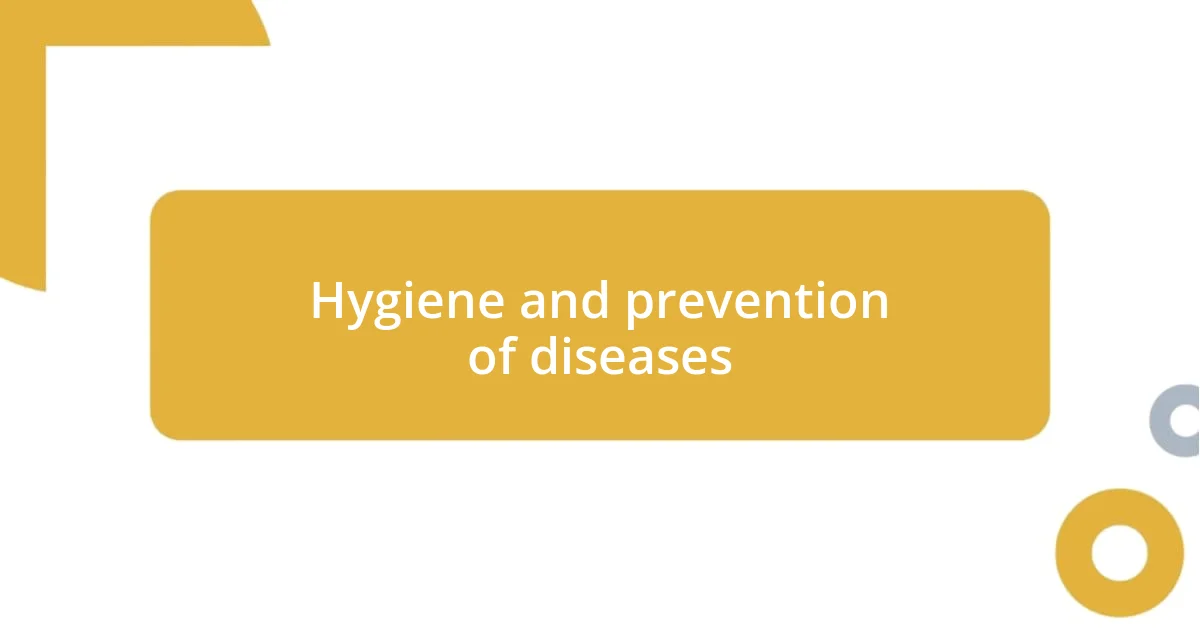
Hygiene and prevention of diseases
Hygiene is a vital shield against diseases, and I often reflect on how a simple act, like handwashing, can wield such power. When I catch myself reaching for a snack, I instinctively think about the germs that could be lurking on my hands. It’s fascinating to realize that this one quick step can prevent so many illnesses—I mean, how many times have I dodged a cold just by making handwashing a priority?
The significance of good hygiene goes beyond individual practices; it extends into wider societal health outcomes. I remember a health workshop where we discussed the staggering drop in hospital visits in communities that embraced regular sanitation practices. Isn’t it incredible how something like clean water and proper waste disposal can save lives? It’s a powerful lesson about the ripple effects of hygiene—when one person commits to cleanliness, it can impact entire neighborhoods.
And let’s not forget the psychological benefits tied to good hygiene. I’ve often experienced that uplifting feeling after a long day when I wash my face and change into fresh clothes. That moment when I glance in the mirror and see someone who looks put-together—it’s invigorating! It makes me wonder: Isn’t it fascinating how our inner wellness is so closely linked to our daily hygiene choices? Feeling clean often translates to feeling good, both physically and mentally.
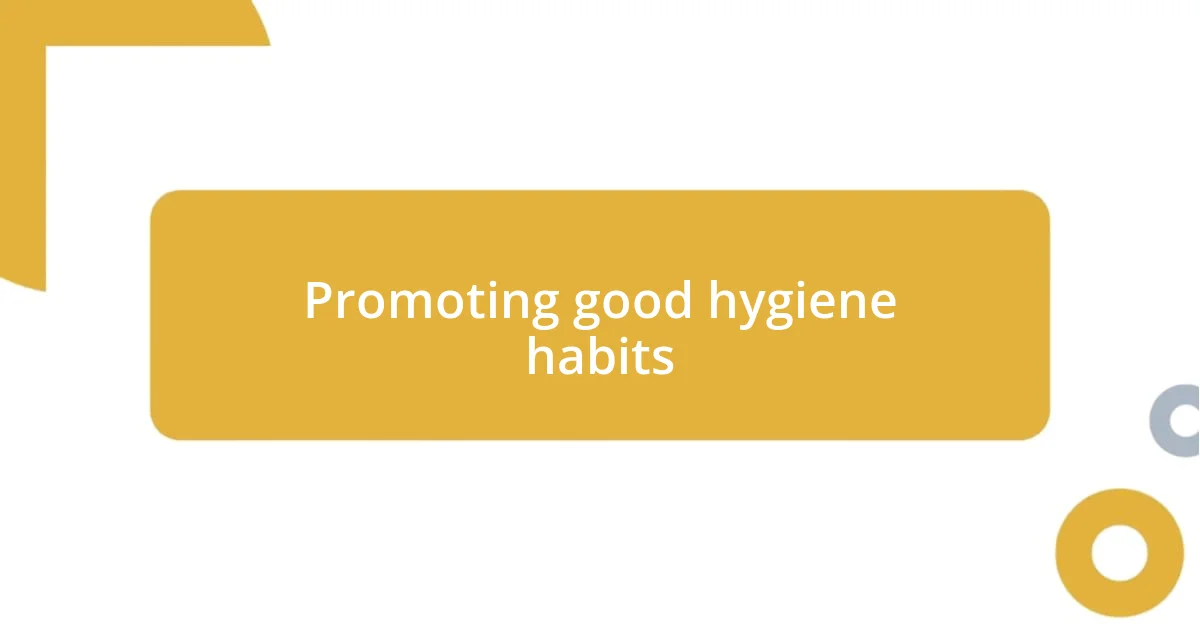
Promoting good hygiene habits
Promoting good hygiene habits starts at a young age, and I’ve seen how powerful that foundation can be. I remember teaching my younger sibling the importance of brushing their teeth every morning and night. It was not just about keeping cavities at bay; it was also about developing a sense of responsibility for their own health. Now, as an adult, I find that these early lessons stick with me. Have you ever noticed how a simple routine can shape your daily well-being?
Encouraging hygiene practices can also be about making it fun. Last summer, I hosted a small gathering where we played hygiene-themed games, turning learning into an engaging experience. For instance, we held a handwashing competition with fun songs that ensured everyone washed their hands long enough. It was surprising to see how laughter blended with knowledge, reinforcing the idea that good hygiene doesn’t have to feel tedious. This playful approach has left a lasting impression on my friends, making them all more mindful of their habits.
Additionally, I believe it’s essential to lead by example. When I prioritized my hygiene, others around me seemed to follow suit. I distinctly recall a time when my commitment to regularly washing my hands prompted my coworkers to be more vigilant too. It made me realize how contagious these habits can be. Have you ever thought about how your own hygiene practices influence those around you? The collective effort not only benefits us individually but also fosters a culture of health within our communities.
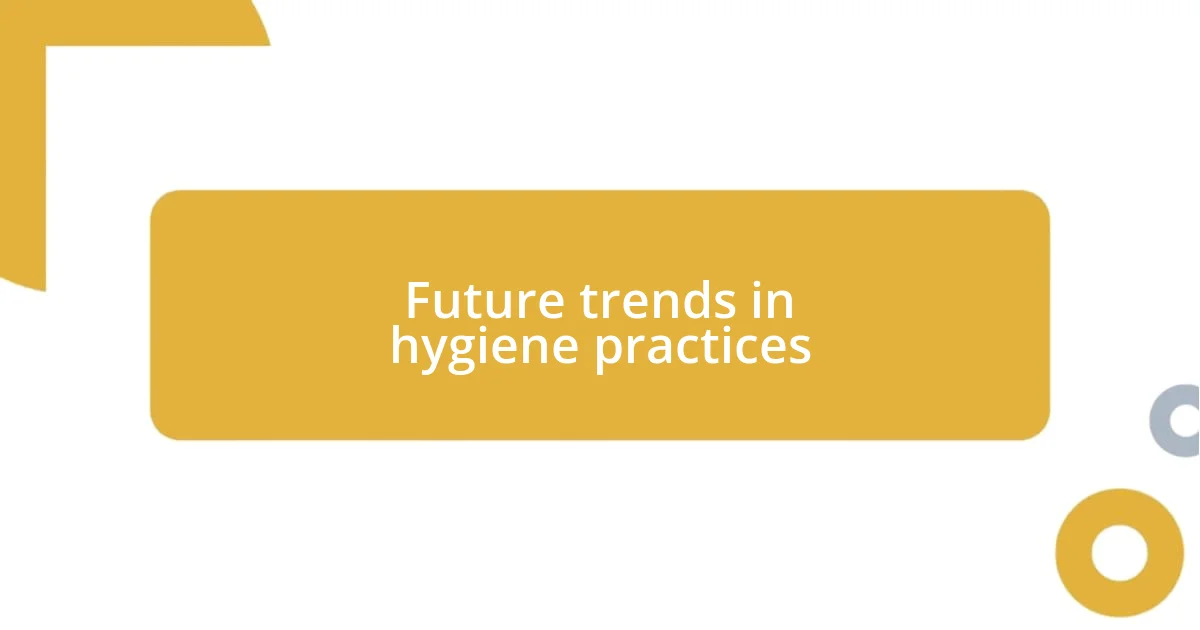
Future trends in hygiene practices
As we look ahead, technology is increasingly redefining hygiene practices. Just the other day, I read about smart sinks and touchless faucets that can enhance cleanliness at home and in public spaces. Isn’t it amazing how something as simple as not touching a tap can reduce germ transmission? I can already envision environments where these innovations become standard, further embedding hygiene into our daily routines.
Moreover, the rise of personalized hygiene products stands out in my mind. Recently, I stumbled across customized toothpaste and skincare formulations designed for individual needs. Doesn’t it feel empowering to use products that cater specifically to our unique body chemistry? This trend not only promotes better hygiene but also connects us more intimately to our personal care routines.
Lastly, I can’t help but think about how the global experience of the pandemic has heightened awareness of hygiene in public spaces. I often remember walking into grocery stores now equipped with hand sanitizer stations everywhere. Have you noticed this shift too? It’s a sign that, moving forward, maintaining hygiene will likely be an integral aspect of our public health strategy, creating a safer environment for everyone.












